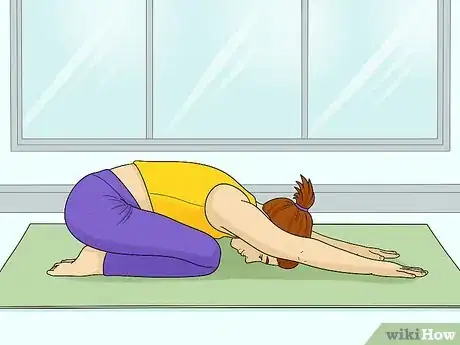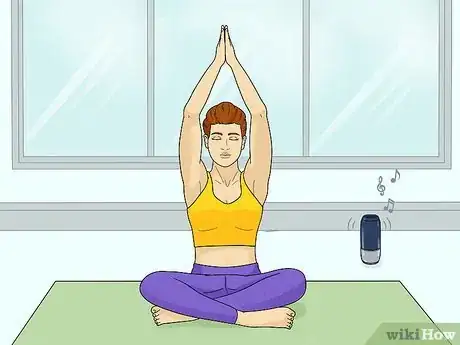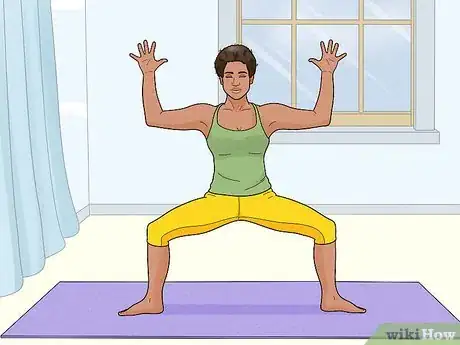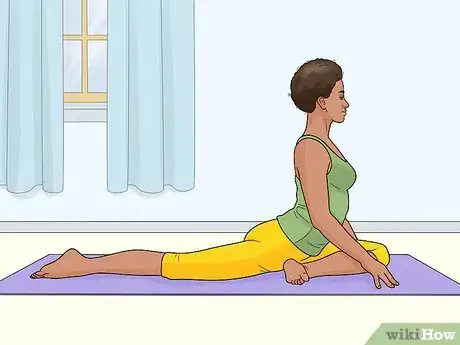This article was co-authored by Atthena Breitton, E-RYT 500 and by wikiHow staff writer, Amber Crain. Atthena Breitton is a Yoga Alliance E-RYT 500 and Continuing Education Provider. She is the Founder & Principal Teacher of AtthenaYoga, a boutique yoga and meditation studio in New York City. She has been teaching since 2015, and some of her clients include NFL football player, Jordan Matthews, and Hip Hop Rapper, Lil Yachty. In addition to her studio, Atthena teaches and lectures around the city at major corporations such as Facebook, Ernst & Young, HSBC, U.S. Bank, and WPP. Atthena follows the path of Bhakti Yoga, a path of selfless love, devotion, and service to the Divine. Atthena holds a BS in Economics with concentrations in Finance and Management from the University of Pennsylvania.
There are 27 references cited in this article, which can be found at the bottom of the page.
This article has been viewed 196,936 times.
According to neuroscientists, yoga can improve your memory, processing skills, and verbal abilities. In fact, it can even change the physical anatomy of your brain; it’s like weightlifting for your mind![1] If you’re looking to improve your attitude and improve your physical and emotional health, it’s hard to find something better than yoga. Combining yoga with positive affirmations is one powerful technique that you can start learning today. If positive thinking doesn't come easily to you, there are some mental strategies and tricks you can try out to help you appreciate life in a whole new way.
Steps
Yoga Principles for Positive Thinking
-
1Move your body in ways that make you feel good. Yoga poses are called "asanas" and they're used to bridge the connection between mind and body. Each asana stimulates your body and mind in a unique way.[2] Relax and allow positive energy to flow through you during each pose.[3]
- As you perform asanas, focus on positive affirmations like "This pose feels good" or "I'm grateful for my body."[4]
- Asanas can be uncomfortable at first because you're not used to moving in particular ways. This is normal and should pass in a few minutes.[5]
- Asanas should never be painful. If you experience pain, adapt the asana to suit your needs or try a different one.[6]
-
2Control your breath to regulate emotions and create inner harmony. In yoga, controlled breathing is called "pranayama" and it works in conjunction with the asanas to create harmony in the body and mind. Work on taking slow, deep breaths as you do each asana.[7] This allows your body to take in more oxygen, which provides many physical, mental, and emotional benefits.[8]
- For example, getting more oxygen helps your body detoxify and function at its best.
- Controlled breathing can help you calm down and reduce anxiety.[9]
Advertisement -
3Relax your mind and body to get rid of negative thoughts. Stress and anxiety trigger negative thoughts. Combining yoga poses and controlled breathing is a powerful way to relax your mind and body. Ultimately, this can reduce your stress levels and make more room for positivity in your life.
- As you relax, focus on a mantra like "I am safe" or "I am at peace."[10]
- You can combine asanas and pranayama with other relaxation techniques, like aromatherapy and soothing music, to reap even more benefits.[11]
-
4Practice mindfulness and meditation to dispel negative thoughts. Meditation is the practice of training your mind by focusing on awareness. There are many different ways to meditate, but the purpose is always the same—to find negative thoughts and feelings within yourself and clear your mind of them.[12]
- Basic Mindfulness Exercise: Sit in a chair or cross-legged on the floor. Choose an aspect of your breath to focus on, like the feeling of air flowing into your nostrils, or your stomach rising and falling. Then, allow yourself to be aware of sounds, sensations, and thoughts. Embrace each sensation or thought without judging it or yourself.[13]
- Welcoming Opposite Thoughts Meditation: Find a quiet place to sit, close your eyes, and take slow, deep breaths. Locate a negative thought, like "I'm powerless," and observe how it impacts your body. Does it hurt in your gut or chest? Then, introduce the opposing thought, "I'm strong," and pay attention to how you feel. Meditating on two opposing thoughts simultaneously can train your mind to accept both and create a sense of wholeness.[14]
Simple Yoga Poses for Positivity
-
1Inhale as you get into cow pose to calm your mind. Spread out your yoga mat on a flat surface. Get on all fours with your hands shoulder-width apart and knees hip-width apart. Start with your spine straight and neutral. Inhale slowly as you drop your belly toward the ground and arch your neck and tail bone up.[15]
-
2Exhale as you transition into cat pose to balance your emotions. Slowly return to the neutral position with your spine straight. Then, breathe out as you gently curl your spine up toward the ceiling and drop your head. Tuck your chin to your chest and point your tail bone toward the floor.[18]
-
3Give the warrior II pose a try to channel your strength.[21] Stand up and take a big step forward with your left foot until your left knee is at a 90-degree angle. Keep your right leg straight and turn your right foot perpendicular to your left. Twist your torso to the right so your left hip faces the front of the room. Extend both arms straight out, parallel to the floor, and turn your head to gaze in the direction of your left arm.[22]
- Hold this pose for 1-5 slow, deep breaths. Then, switch legs and hold for another 1-5 breaths.
- Optional positive affirmation: “I am strong in mind, body, and spirit."[23]
-
4Do the goddess pose for energy and empowerment. Stand up straight and spread your feet about 3 feet (0.91 m) apart. Turn your toes out and heels in so each foot is at a 45-degree angle. Exhale as you bend your knees until your thighs are parallel to the ground and your hips are level with your knees. Extend your arms straight out to your sides and bend your elbows 90 degrees with your palms facing out and fingers spread out wide. Hold the pose for 5 deep breaths.[24]
-
5Use the downward facing dog pose to boost your mood.[27] Get down on all fours with your hands shoulder-distance apart and your knees hip-distance apart. Inhale and push your body up with your palms until your knees are off the ground. Lift your hips toward the ceiling and exhale as you straighten out your legs as much as possible.[28]
-
6Transition into pigeon pose to release tension and embrace positivity. Start in downward facing dog. Exhale as you lift your right foot off the ground and bring your knee up toward your chest. Gently lower your right knee to the ground next to your right wrist and align your shin with the top edge of your mat. Then, lower your left leg down to the ground and extend it straight back behind you. Square your hips to the front of the room as you inhale slowly. Hold the pose for 30 seconds.[31]
- To complete the pose, plant your palms and return to downward facing dog position. Then, repeat the pose with your other leg.
- Optional positive affirmation: “I deserve love and happiness."[32]
Positive Thinking Techniques
-
1Use positive language when you think and speak. Pay attention to how you think about things and talk to others. Are you using negative language more than you realize? It sounds too simple to be true, but thinking and speaking with negative language affects your outlook and well-being. Check in with yourself a few times a day to evaluate the language you’re using.[33]
- For example, if you think "I'll never get the hang of this," the negative word you want to avoid is "never." If you say "I can't finish this," the word "can't" is what you need to get rid of.
- Try to use phrases like “I can do this,” “I am capable,” “This is possible,” “It can be done,” and so on.[34]
- If you’re having trouble with this, consider creating a list of positive words that you can start incorporating in your life.[35]
-
2Reframe negative self-talk with positive affirmations. When a negative thought pops into your mind, find a way to reframe that thought in a more positive way. Try to think about yourself with the same respect and kindness you show others. This takes practice, but you’ll get the hang of it![36] For example:
- Instead of “I’ve never done this before” try “I can use this opportunity to learn something new.”
- Instead of “I’m just not good at this” try “I’m going to give this another try.”
- Instead of “This is too hard for me” try “I can try to tackle this with a different approach.”
-
3Spend your time with positive people who support you. Hanging around with negative people can rub off on you and perpetuate negative thought patterns. Try to spend your time with people who are openly optimistic. Make friends with people who support your endeavors and give you helpful feedback.[37]
- You can't control who you're around all the time, but do your best to gravitate toward the positive people in any given situation.
-
4Savor and celebrate good things when they happen. If you experience something positive, make it a point to slow down and focus on that experience. Try to consciously enjoy the moment as it happens. Then, hold on to those positive emotions and revisit them whenever you need a boost.[38]
- Don't just savor the big moments in life. You can savor small pleasures, too. For example, if you’re having a meal with a friend, stay in the moment and really enjoy the experience.[39]
-
5Try to practice gratitude by journaling regularly. Spend time thinking about the good things in your life and write them down in a journal or notebook. Be as specific as you can. Doing this on a regular basis can help you appreciate what you have and view your life in a more positive light.[40]
- You can do this daily or a couple of time per week, depending on your schedule and preferences.
- Feel free to write full journal entries or create gratitude lists—whatever works best for you!
-
6Visualize your success before you start something new. Don’t just create goals for yourself and hope for the best—picture yourself actually achieving those goals. Imagine what it will be like and how happy or proud you'll feel about your accomplishment. Try to focus on thoughts of success, happiness, and strength before you dive into any new project.[41]
- For example, if you're about to start a new job, visualize yourself succeeding every day, getting along with your coworkers, and eventually getting a raise.
Expert Q&A
Did you know you can get expert answers for this article?
Unlock expert answers by supporting wikiHow
-
QuestionWhat is the best time to do yoga?
 Atthena Breitton, E-RYT 500Atthena Breitton is a Yoga Alliance E-RYT 500 and Continuing Education Provider. She is the Founder & Principal Teacher of AtthenaYoga, a boutique yoga and meditation studio in New York City. She has been teaching since 2015, and some of her clients include NFL football player, Jordan Matthews, and Hip Hop Rapper, Lil Yachty. In addition to her studio, Atthena teaches and lectures around the city at major corporations such as Facebook, Ernst & Young, HSBC, U.S. Bank, and WPP. Atthena follows the path of Bhakti Yoga, a path of selfless love, devotion, and service to the Divine. Atthena holds a BS in Economics with concentrations in Finance and Management from the University of Pennsylvania.
Atthena Breitton, E-RYT 500Atthena Breitton is a Yoga Alliance E-RYT 500 and Continuing Education Provider. She is the Founder & Principal Teacher of AtthenaYoga, a boutique yoga and meditation studio in New York City. She has been teaching since 2015, and some of her clients include NFL football player, Jordan Matthews, and Hip Hop Rapper, Lil Yachty. In addition to her studio, Atthena teaches and lectures around the city at major corporations such as Facebook, Ernst & Young, HSBC, U.S. Bank, and WPP. Atthena follows the path of Bhakti Yoga, a path of selfless love, devotion, and service to the Divine. Atthena holds a BS in Economics with concentrations in Finance and Management from the University of Pennsylvania.
Yoga Instructor & Educator
-
QuestionIs yoga hard?
 Atthena Breitton, E-RYT 500Atthena Breitton is a Yoga Alliance E-RYT 500 and Continuing Education Provider. She is the Founder & Principal Teacher of AtthenaYoga, a boutique yoga and meditation studio in New York City. She has been teaching since 2015, and some of her clients include NFL football player, Jordan Matthews, and Hip Hop Rapper, Lil Yachty. In addition to her studio, Atthena teaches and lectures around the city at major corporations such as Facebook, Ernst & Young, HSBC, U.S. Bank, and WPP. Atthena follows the path of Bhakti Yoga, a path of selfless love, devotion, and service to the Divine. Atthena holds a BS in Economics with concentrations in Finance and Management from the University of Pennsylvania.
Atthena Breitton, E-RYT 500Atthena Breitton is a Yoga Alliance E-RYT 500 and Continuing Education Provider. She is the Founder & Principal Teacher of AtthenaYoga, a boutique yoga and meditation studio in New York City. She has been teaching since 2015, and some of her clients include NFL football player, Jordan Matthews, and Hip Hop Rapper, Lil Yachty. In addition to her studio, Atthena teaches and lectures around the city at major corporations such as Facebook, Ernst & Young, HSBC, U.S. Bank, and WPP. Atthena follows the path of Bhakti Yoga, a path of selfless love, devotion, and service to the Divine. Atthena holds a BS in Economics with concentrations in Finance and Management from the University of Pennsylvania.
Yoga Instructor & Educator It can certainly be challenging depending on the poses or type of yoga that you're doing, but it's definitely something everyone can do, especially if they have a good teacher. The one thing I'd point out is that if you find yoga exceptionally difficult, you may be pushing your body farther than you should. It shouldn't be painful, though.
It can certainly be challenging depending on the poses or type of yoga that you're doing, but it's definitely something everyone can do, especially if they have a good teacher. The one thing I'd point out is that if you find yoga exceptionally difficult, you may be pushing your body farther than you should. It shouldn't be painful, though. -
QuestionHow can I get more comfortable while doing yoga?
 Atthena Breitton, E-RYT 500Atthena Breitton is a Yoga Alliance E-RYT 500 and Continuing Education Provider. She is the Founder & Principal Teacher of AtthenaYoga, a boutique yoga and meditation studio in New York City. She has been teaching since 2015, and some of her clients include NFL football player, Jordan Matthews, and Hip Hop Rapper, Lil Yachty. In addition to her studio, Atthena teaches and lectures around the city at major corporations such as Facebook, Ernst & Young, HSBC, U.S. Bank, and WPP. Atthena follows the path of Bhakti Yoga, a path of selfless love, devotion, and service to the Divine. Atthena holds a BS in Economics with concentrations in Finance and Management from the University of Pennsylvania.
Atthena Breitton, E-RYT 500Atthena Breitton is a Yoga Alliance E-RYT 500 and Continuing Education Provider. She is the Founder & Principal Teacher of AtthenaYoga, a boutique yoga and meditation studio in New York City. She has been teaching since 2015, and some of her clients include NFL football player, Jordan Matthews, and Hip Hop Rapper, Lil Yachty. In addition to her studio, Atthena teaches and lectures around the city at major corporations such as Facebook, Ernst & Young, HSBC, U.S. Bank, and WPP. Atthena follows the path of Bhakti Yoga, a path of selfless love, devotion, and service to the Divine. Atthena holds a BS in Economics with concentrations in Finance and Management from the University of Pennsylvania.
Yoga Instructor & Educator
References
- ↑ https://www.ncbi.nlm.nih.gov/pmc/articles/PMC6971819/
- ↑ https://www.gaia.com/article/asanas
- ↑ https://www.yogapedia.com/definition/4951/asana
- ↑ https://www.yogajournal.com/practice/yoga-for-inner-peace-mood-boosting-rocking-sequence
- ↑ https://www.artofliving.org/us-en/right-way-of-doing-yoga-asanas
- ↑ https://yogainternational.com/article/view/yoga-asanas
- ↑ Atthena Breitton, E-RYT 500. Yoga Instructor & Educator. Expert Interview. 4 March 2020.
- ↑ https://www.artofliving.org/us-en/yoga/breathing-techniques/yoga-and-pranayama
- ↑ https://www.helpguide.org/articles/stress/relaxation-techniques-for-stress-relief.htm
- ↑ https://healthy.kaiserpermanente.org/washington/health-wellness/healtharticle.40-positive-affirmations
- ↑ https://www.helpguide.org/articles/stress/relaxation-techniques-for-stress-relief.htm
- ↑ https://www.psychologytoday.com/us/basics/meditation
- ↑ https://www.helpguide.org/harvard/benefits-of-mindfulness.htm
- ↑ https://www.yogajournal.com/meditation/transform-negative-thoughts-meditation
- ↑ https://www.doyou.com/cat-cow-pose-yoga/
- ↑ https://www.doyou.com/the-holistic-benefits-of-catcow-pose-56731/
- ↑ https://wholeself.yoga/2019/11/26/how-to-embrace-positive-thinking/
- ↑ https://www.doyou.com/cat-cow-pose-yoga/
- ↑ https://www.doyou.com/the-holistic-benefits-of-catcow-pose-56731/
- ↑ https://healthy.kaiserpermanente.org/washington/health-wellness/healtharticle.40-positive-affirmations
- ↑ https://www.doyou.com/warrior-ii-pose/
- ↑ https://www.self.com/gallery/must-know-yoga-poses-for-beginners
- ↑ https://healthy.kaiserpermanente.org/washington/health-wellness/healtharticle.40-positive-affirmations
- ↑ https://www.doyou.com/how-to-do-goddess-pose/
- ↑ https://wholeself.yoga/2019/11/26/how-to-embrace-positive-thinking/
- ↑ https://www.doyou.com/9-yoga-poses-and-mantras-for-happiness/
- ↑ https://www.doyou.com/the-holistic-benefits-of-downward-facing-dog/
- ↑ https://www.nytimes.com/guides/well/activity/downward-facing-dog
- ↑ https://www.self.com/gallery/must-know-yoga-poses-for-beginners
- ↑ https://wholeself.yoga/2019/11/26/how-to-embrace-positive-thinking/
- ↑ https://www.doyou.com/how-to-do-pigeon-pose-variation/
- ↑ https://healthy.kaiserpermanente.org/washington/health-wellness/healtharticle.40-positive-affirmations
- ↑ https://www.mayoclinic.org/healthy-lifestyle/stress-management/in-depth/positive-thinking/art-20043950
- ↑ https://www.canr.msu.edu/news/positive_thinking_makes_a_difference
- ↑ https://www.psychologytoday.com/us/blog/click-here-happiness/201803/think-positive-11-ways-boost-positive-thinking
- ↑ https://www.mayoclinic.org/healthy-lifestyle/stress-management/in-depth/positive-thinking/art-20043950
- ↑ https://www.mayoclinic.org/healthy-lifestyle/stress-management/in-depth/positive-thinking/art-20043950
- ↑ https://www.psychologytoday.com/us/blog/click-here-happiness/201803/think-positive-11-ways-boost-positive-thinking
- ↑ https://www.health.harvard.edu/mind-and-mood/how-to-achieve-a-positive-attitude
- ↑ https://www.health.harvard.edu/mind-and-mood/how-to-achieve-a-positive-attitude
- ↑ https://www.canr.msu.edu/news/positive_thinking_makes_a_difference
About This Article
To combine yoga and positive thinking, you really want to focus on doing poses that feel good. Breathe deeply and focus on your body and positive thoughts. Repeat positive affirmations, like "I am grateful for my body," "I am at peace," and "I am safe." If negative thoughts do come, don't worry—just acknowledge them and then redirect your attention back to your body, breathing, or positive affirmations. The goal of combining yoga and positive thinking is to feel good and get into a good headspace, so don't worry about doing it "right" or nailing your yoga poses perfectly. Just enjoy yourself! For more expert yoga tips, check out the full article below.





























-Step-16.webp)














































